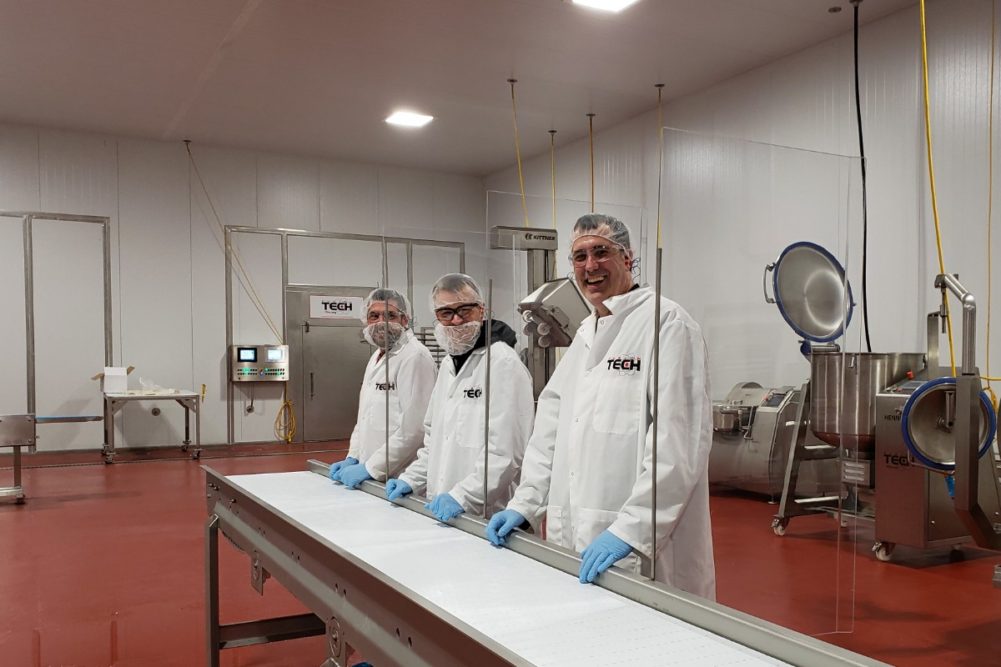ROSEVILLE, ILL. – Well before meat and poultry plant closures related to the coronavirus (COVID-19) became daily news, Brandon Bentz saw a precaution implemented by a retail operator that triggered an idea for a solution that could be adapted for his customers. Bentz, the vice president of Fusion Tech Integrated Inc., a manufacturer of custom processing equipment and solutions, said it was in the early stages of the pandemic when he saw something at his local grocery store one evening that got his mental wheels turning.
“I saw the polycarbonate shields that they were putting in front of the cash registers,” he said.
The very next day he collaborated with a project manager at work to develop a similar solution to facilitate social distancing at meat and poultry processing plants. Because workers are often positioned shoulder to shoulder or face to face on fabrication lines without protection from being infected by co-workers, creating barriers between workstations seemed to be a logical solution for processing companies.
“That’s what we need to do on these big conveyance lines and on these boning lines,” Bentz said, “put guards in between them. And that’s kind of how it started.”
That same day, he and his team built a prototype and mounted the customized polycarbonate shield on a conveyor frame in the Fusion Tech shop. After sharing photographs of the prototype with some well-known companies in the industry, Bentz said interest in the concept from processors was immediate. The concept was fast tracked through the drafting and engineering process and the manufacturing process began in a flurry. Smithfield’s pork plants in nearby Monmouth, Ill., and in Virginia were among the first customers to order the guards, which quickly grew to adapt to multiple applications, including side guards, face guards, hinged guards to allow for egress and even a floor-mounted, free-standing post to hang the guards from.
“So, we’re stocking them now, trying to keep at least 500 guards on the shelf at a time,” Bentz said.
The goal, he said, is to limit lead time because of the devastating nature of outbreaks at plants.
“We’re making sure that these customers don’t need to wait, and we can get these loaded on a truck and get them out of here.”
Just prior to an outbreak that ultimately caused Smithfield’s Sioux Falls, SD, plant to close, Fusion Tech shuttled guards to that facility, but by the time the shipment was received and the guards were installed, the plant was closed as a result of positive cases of the virus mounting quickly.
Currently, the side guards and face guards arrive at the customer’s facility with mounting brackets and the hardware needed to either bolt them to the frame of a conveyor system or they can be mounted to a free-standing pole that is anchored to the floor. Depending on a plant’s line configuration, installation requires about 15 minutes for each guard, Bentz said.
Since rolling out the guards, orders range from a handful for smaller processors up to as many as 900 units for customers like Smithfield.
With prices starting at $130 per workstation, Bentz said the goal of developing the guard was not to gouge processors trying to stay in business during an unprecedented crisis.
“Obviously, we did not do this to get rich off of it, as it’s mainly to help our customer base,” Bentz added. “That’s the most important thing for us because that’s where we derive all of our business from.”
Additionally, for each guard Fusion Tech sells, it is donating $5 to the local food banks in the Roseville area.
As plant operators adjust to implementing social distancing protocols, especially on a labor-heavy processing line, the goal of most is to maintain the same number of bodies on a line, even with work- station guards. To that end, Fusion Tech’s guards were originally designed for workstations with 36-inch centers. However, some processors Bentz has heard from are slowing line speeds by half or more and eliminating a line position or more to allow for more space.
In the post COVID-19 era, Bentz believes social distancing and protecting workers from illness will be a priority at most processing plants, and that will likely include guards to separate workstations.
“To calm everybody down and get back to production, I think you’re going to have to have some kind of interventions,” Bentz said.


